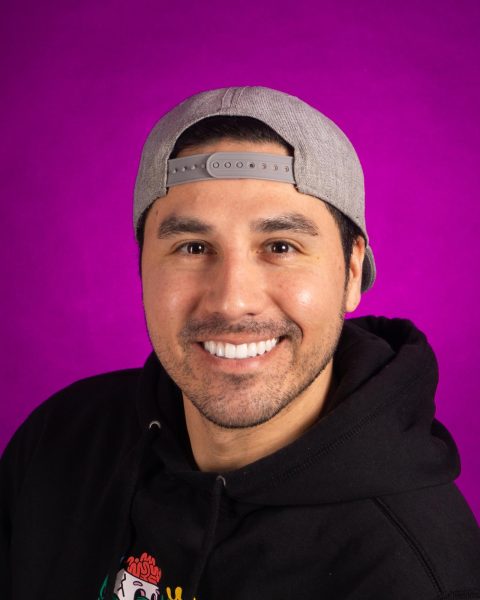Intro
Zac Zavala
Welcome back to Gator talk. I’m Zac Zavala reporting for the Golden Gate Xpress and today I have the honor of interviewing Marc Grossman. Our goal for today’s conversation dives into the historical impact of Cesar Chavez’s work through the eyes of individuals like Marc who shared his journey to educate and inspire future generations about his contribution to social justice and labor rights. Marc, thanks for being here.
Interview
Marc Grossman
My pleasure Zac.
Zac Zavala
Can you please share how you first became involved with the Cesar Chavez movement?
Marc Grossman
Well, if you were on or near campus in the late ‘60s, you were boycotting grapes or something else. I spent a lot of time on picket lines after class and Fridays, we’d go on car caravans taking donated food and clothing to the strikers into Deleno. So I met Cesar that way, but I really got to know him through his eldest son, Fernando — nickname is “Polly” around family, been my best friend since we were 19, 20 year olds. So once I got involved, I never stopped. This is my 55th year.
Zac Zavala
Wow. And you’re still involved with the foundation today?
Marc Grossman
Yes.
Zac Zavala
And what are some of the most vivid memories and experiences working with alongside Cesar Chavez and some of the struggles that you went through and how you overcame them?
Marc Grossman
Well, I helped Cesar with his speeches and presswork. But by far, the most challenging duties came as his personal aide. He’d take me with him, almost everywhere in California, often out of state. Those were very intense times. 1975, when Cesar had his longest, least-known march 1000 miles in 59 days to take news to farm workers, their newly won rights under the state farm labor law that had just passed, we’d marched 20 miles a day and is the era before cell phones andhe still had to run the union, I learned the location of every payphone in rural California. I called — yeah, get his messages, find out the decisions that couldn’t wait for him to be on the phone late at night, go to the march, brief him. He’d instruct me, I’d find the next payphone, and then after marching 20 miles a day, we’d have a three hour rally with farmworkers, hundreds of them were organizing their companies to get home to the house he was staying at, usually farm workers home in rural areas. And he had the only meal of the day and then I’d help him organize the calls he had to return late at night before he was going to bed. He was 48, no spring chicken, and he was worried about physically maintaining it. I had a big tub filled with water as hot as he could stand and Epsom salts. He’d sit on the bed in his room and put his feet in the water and lay on his back. He’d be out in four or five minutes. I’d wait and put him in bed, cover him up and that went on for 59 days. The guy’s on his security detail and I, we were 20, 25 years younger than he was and we had trouble keeping up. You had to keep up with his schedule, his pace, the demands he put on himself. And this was all under the shadow of federal agents nullifying the union of assassination plots.
Zac Zavala
Wow. And when you heard about those assassination plots, like what was the first thing that went through your head and what was the first thing that went through Cesar’s head?
Marc Grossman
Once, an agency even gave us photographs of the hitman who had been hired. CHP arrested the guy outside Salinas, about 10 miles from where Cesar had been the day before. He was stalking him. Cesar told his wife — he was on the road for about two, three weeks, never sleeping in the same place twice and finally told Helen. His wife said, “I’m gonna go home, I want to go back to work. And I’m not a coward, I didn’t do anything wrong. And if they want to kill me, then that’s God’s will.” But he wouldn’t be intimidated.
Zac Zavala
That’s super brave. And can you share a story that most people wouldn’t know about Mr. Chavez?
Marc Grossman
Cesar would have often have trouble holding on to secretaries or office workers. If they’re good, you normally want to hold on to them, but not Cesar if, especially if they came from a farm worker, working class family. If they had talent, Cesar would get him to be something more — push them really hard to become an administrator, a negotiator, an accountant. There were literally hundreds of young women and men that — he helped them fulfill dreams some of them didn’t even though they had at the time. And thousands of people like me trace our social political activism to the training and experience we had working with Cesar and the movement. And really, in the end, wasn’t that what he wanted for farm workers? To — the capacity to be able to sit across the bargaining table with their employers, as equals, and not staff to take orders all their lives, you know. He looked and talked and acted and behaved pretty much like the people he was trying to help and farmworkers and Latinos especially would look at him, and they’d say to themselves and others, you know, you know, he looks like my father, my uncle, my brother, my husband. If Cesar Chavez can do these great things, maybe I can too. I think sometimes we hold our heroes too high up and too far away.
Zac Zavala
Yeah. Can you share any stories or anecdotes that illustrate how working with Chavez has influenced or shaped your own beliefs and values?
Marc Grossman
A journalist with one of the national magazines came out to California in mid ‘70s to do a profile on him and follow him around farm worker rallies, meetings marches. Wherever he was with workers, they would have them sign leaflets and hats and flags, all manner of things and fathers would take photographs of Cesar with their young children using these little instamatic cameras. The reporter in an interview later asked Cesar, what accounts for all the affection and respect farm workers show you in public, And Cesar paused and smiled and he just said, “The feeling is mutual.” You know, I earned two degrees from the University California after getting involved with the movement. But the most important lessons in my life, I learned working with Cesar and the farmworkers, lessons about self sacrifice and commitment, about what it means to be a man, about what it means to be part of something bigger than you are.
Zac Zavala
Yeah. And with that, like looking back, how do you think Chavez’s legacy continues to impact social justice? In today’s world, we have fake news, we have, you know, many news sources from whether they be social media, or, you know, news outlets that people don’t really agree with or align with. I’m wondering what that take on what that would, you know, mean to you? Or what do you think, Mr. Chavez, when we think about that, in today’s world, and how that would affect, you know, on movement?
Marc Grossman
People don’t know today, or they forget, that Cesar probably had more defeats and victories. And after each defeat, he would pick himself up up off the ground, dust himself off and rejoin the fight. He’d say “nuestra causa,” our cause. It’s not like a baseball game, you go nine innings, whoever has the most ones wins, the other team loses, or a political race, run a campaign, whoever gets the most votes wins and the others lose. He’d say “In our struggle, you only lose when you stop fighting, when you give up.” So the lesson was, if you persist, if you resist, and if you don’t stop fighting, you’re gonna win in the end. He used to say that the rich have money and the poor have time.
Zac Zavala
That’s super true, because, you know, not everyone has their, you know, set journey and everyone’s journey is different. And you mean, so whether or not you have the ample resources to have that extra time, it really makes a big difference on where your life is gonna take you. What advice would you offer to younger generations who inspired — who are inspired by Chavez’s movement and want to make a difference in their own communities? You know, to dig a little deeper, you know, San Francisco State, you know, we have a building dedicated to Cesar Chavez, our student center, and I’m very proud to be a student here as well, you know, our students are known for, you know, fighting for what they believe for, I mean, they have rallies and are not afraid to really speak up, especially in this day and age for what is right at the end of the day.
Marc Grossman
Well, if Cesar were around, you know, he would be aghast at all the public places, things that are named for him. He rarely let anybody do that when he was alive. And he would say, you know, “Don’t you have something more important to do with your time?” But someone once told me that the greatest thing that you can achieve in your life is to be a man or a woman of your times. And when my comrades and I were young, in the movement, we lived in tumultuous times, and we helped each other do some great things. We didn’t succeed everywhere. But at least we can take some comfort in knowing that we didn’t sit on the sidelines, we joined the cause, and we engaged in the fight, and we got to know what it means to be part of something bigger than you are. And I think that’s a yearning that is every bit as timely and as relevant today as it was in Cesar’s time, you know, everyone needs to find something that they’re willing to fight for, something that’s more important than they are.
Zac Zavala
This isn’t your first time to San Francisco State is it? Could you tell me a little bit more that?
Marc Grossman
Fall 1976, UFW had a big statewide political campaign, Cesar was invited here, I believe, by the local MECha Chicano student group. And he spoke here, but it wasn’t his first time here in 1965, second month, the Delano grape strike Cesar went to Cal Berkeley and Sproul Plaza, spoke there. And then they drove across the bay and he came to San Francisco State. It was a unlike — I think Cal Berkeley then was a little more intense than SF State — but he spoke in a classroom and lecture hall, about 400 students. No one knew who he was, but that was his first visit on campus.
Zac Zavala
While his legacy has definitely left a big impact on us. And I’m sure just future generations as well.
Marc Grossman
Cesar had a, you know — today his name was invoked often to promote higher education, especially. And, you know, he was this is the guy with an 8th grade education,but he was incredibly read. If you ever are going down Southern California, in Kern County, where he spent his last quarter century, is now we call it the National Chavez Center —187 acres up in the mountains, Town of Keene, man, about a little more than two acres is now the Cesar Chavez National Monument, which is the 398th unit of the National Park Service. Cesar Chavez Foundation administers in a partnership with the Park Service, but in there is his carefully preserved office library. There must be three-four thousand volumes, and, and he taught himself accounting by reading a book and his reading interests were eclectic, I mean, from literature, Tolstoy, Dostoevsky, to financial management, to history and photography, and the arts. But when he would find — he would meet a young college student that he thought had promise, and he’s so nice, he would say, “Oh, well, why don’t you quit your college and come to work for my college?” He tried to recruit them. But it wasn’t that he didn’t respect education. And there were certain subjects that he specially — like, he knew I had a master’s degree in journalism, that was something you can use, you know —but just going to college for the purpose of going to college — getting a degree, didn’t quite deal to him. And he thought education needed to have a greater meaning than just, you know, personal advancement for one individual. You know, you couldn’t just, you know, go away to college and forget where you came from. And that he’d say, you know, education must have meaning for your community to — you need to be able to use it. You know, you can’t just forget about, you know, the people you left behind. He said, “The end of all education must be service to others.”
Zac Zavala
I mean, he has these almost these sayings that you find in a fortune cookie.
Marc Grossman
Well, there’s a — go look up his speech, 1984, to the Commonwealth Club in San Francisco here. And it was the first time that he ever spoke from a text. You know, not that we didn’t work hard on his speeches, but he would use outlines, you know, Roman numeral one, capital A Arabic numeral one, that way, and so he would prepare, but he thought that reading from a text was phony — is what the politicians do. And then finally, I convinced him in this case, that speech is so important to every word counts, and he agreed. And so, you know, it was he got in there — but you know, who was the president of the Commonwealth Club that year was Shirley Temple-Black, you know, the child actress. And when the invitation came, he was a little, you know, wary he because she was a Nixon supporter. So he asked me to check it out, called the club, Mrs. Black called back right away. And turned out she was a big fan, you know, when she was a child actress, she had, you know — didn’t make any more films after childhood, and then but she kept up, she kept up her membership in the Screen Actors Guild and wanted to support other actors. And then years later, she needed radical cancer surgery, and it was all paid for with a union health plan. So she was really pretty good trade unionist. And you know, very much wanted Cesar to go, and we worked really hard on that speech. And he — it’s one of the few times he was very introspective, but placed himself and his union in a historical context. You know, and take a look at it, you know. They had lunch on the dais before he spoke and they got along like old friends — had interest in vegetarianism and gardening. You know, it’s like they’d known each other forever.
Zac Zavala
Was Cesar a vegetarian?
Marc Grossman
Oh, strict vegetarian. Yeah. I think he took as much personal satisfaction in converting people to vegetarianism as trade union. Worked on me for years to no effect.
Zac Zavala
Are you vegetarian?
Marc Grossman
Oh, no. Yeah. But he got me to, he got me to give up pork for a year. Say you have this wonderful 5800 year tradition, Judaism, and you eat pork. So, guilt tripped me into doing that for a while. But you know, in my family, you not only had to marry someone who was Jewish, had to be Russian. And I married two Mexican Catholics. And before that, I fell in love with a third. So we have three Mexi-Jews sons, and now we have two beautiful little granddaughters, 5 and 8. And the 8 year old, she likes to boast. I know Latina. She’s a quarter. That’s all right. So America.
Zac Zavala
Real quick before I let you go, how did Cesar deal with the fame and the recognition of what he was doing?
Marc Grossman
He took me aside once like 45, 50 years ago, actually. And he said, here’s three lessons to live by he said, “Never take yourself too seriously. Never get in a pissing contest with a skunk and never let a son of a bitch know that you know, he’s a son of a bitch.” Pretty prescient whenou think about it.
Zac Zavala
Another fortune cookie. Thank you. Marc, thank you again so much for being here and for sharing your firsthand accounts with us today.
Marc Grossman
Thank you for having us.
Outro
Zac Zavala
Thank you. Thanks for watching Gator Talk. We’ll be back with more episodes.









